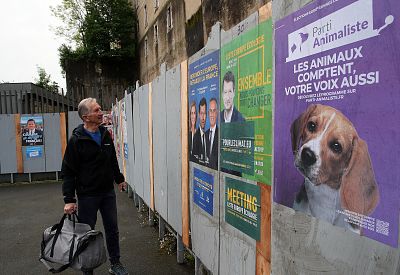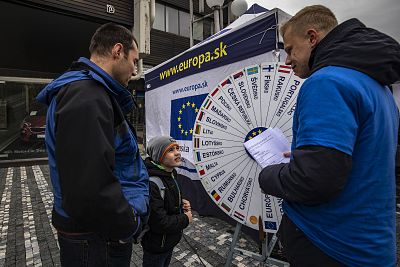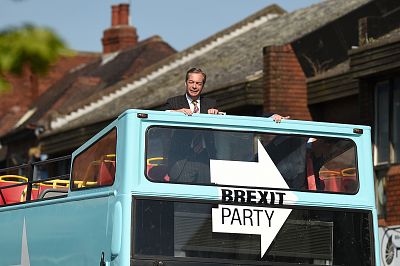The elections have been overshadowed by the growth of nationalist, Euroskeptic parties.
Voting began Thursday in what could be the most important European Parliament elections in a generation.
 ADVERTISEMENT
ADVERTISEMENT
 ADVERTISEMENT
ADVERTISEMENT
All 28 European Union nations are choosing who should sit in the 751 seats of the European Parliament in Strasbourg, which approves the bloc's budget and passes laws. The process is the second-largest democratic exercise in the world, behind the Indian general election.
Don't hold your breath, though: While polls are already open in the United Kingdom and the Netherlands, most countries will vote Sunday and the results will likely not be clear until Monday morning.
Why does this matter?
Member nations have their own separate elections to choose their national parliaments and local politicians, but the E.U. Parliament votes on the bloc's $150 billion annual budget and passes legislation that affects some 500 million people.
And this election comes at a key time for the future of the entire E.U. project.
The 2016 Brexit vote to leave the union shook the E.U to its core and coincided with the growth of right-wing, nationalist parties across the continent.
Charismatic young populist candidates from France, Belgium, Italy and elsewhere are threatening to upset the consensus that the E.U. is a universal force for good.
Not everyone in Europe was keen to welcome refugees from Africa and the Middle East, who began arriving in large numbers in 2015, adding fuel to nativist voices across the bloc.
For the first time, parties that are critical and even opposed to the European project may have a say in how it is run.
As Jordan Bardella, 23, a rising star of Marine Le Pen's National Rally party in France,told NBC News this week: "We have the opportunity to arrive in force in front of the European Commission and to upturn the table."
Euroskeptic parties overall arepredicted to win about 35 percent of the vote across the continent. Italy's deputy prime minister, Matteo Salvini — from the far-right Lega Nord party — has already pledged to form a new right-wing caucus within the European Parliament which would push for reforms to limit the E.U.'s power.
Guy Verhofstadt, the European Parliament's chief Brexit coordinator and a former Belgian prime minister, told CNN on Tuesday of Salvini's plan: ""Reform? I don't call that reform. I call that the kiss of death. Instead of beating it from outside, it will die inside."
Who's going to win?
Members of the European Parliament (MEPs) organize themselves into parties, just like in a national parliament or the U.S. Congress, and In the last elections in 2014, the biggest of these was the European People's Party (EPP), a grouping of various center-right parties from across Europe which has traditionally governed alongside the center-left Socialists & Democrats group, among others.
The EPP is likely to remain the biggest party, but could lose seats and it's unclear whether it will be able to lead a coalition without reaching out to smaller, more radical groups.
Also unclear is how a new European Commission president will be chosen. This is normally someone selected by the biggest party in Parliament — it's currently Jean-Claude Juncker — but this time it's likely to be a hotly debated appointment.
What about Brexit?
To confuse things even further, the U.K. wasn't even supposed to be contesting these elections — and now the British government's failure to make Brexit happen has spawned the new Brexit Party, led by Nigel Farage, which is predicted to get as much as 37 percent of the British vote in these elections, by far the biggest share, just two months after forming.
The ruling Conservative Party is set to get a humiliating 7 percent, while the opposition Labour Party isn't faring too much better on 13 percent, according to an opinion poll from YouGov published Wednesday.
So that's yet another Euroskeptic, nationalist party to challenge the E.U.'s centrist grand coalition.
And meanwhile, if Prime Minister Theresa May does — on the fourth attempt — manage to get her Brexit withdrawal agreement through the House of Commons in the first week of June as planned, the U.K. would send no MEPs to Strasbourg, despite these elections costing the U.K. in excess of $120 million. Even people who have just won a seat for the first time wouldn't get to take them.
It's worth remembering that the European Parliament's powers are limited: It can only approve or block legislation from the commission, in a system that critics say has failed to adequately deal with a range of issues, such as migration.
And with its new influx, the politics of the E.U. could be about to get even complex and divided.
As Prof. Simon Hix of the London School of Economics writes, this could be just the beginning: "The new parliament will be a difficult partner for the governments and the commission, who will not be able to rely on a stable coalition.
"The result could be policy gridlock in the EU in the coming years, which could further encourage anti-European sentiments in many countries."













